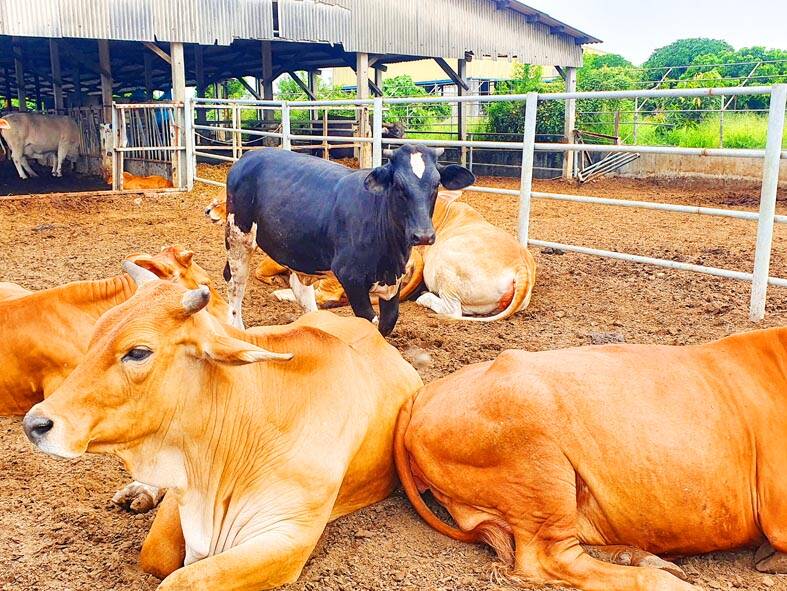Dairy farmers have urged the government to bar certain imported milk from using the “fresh milk” label, as fears about competition mount after a trade agreement was signed between Taiwan and New Zealand.
In response, the Ministry of Agriculture said it has already advised the Food and Drug Administration to require dairy with a shelf life of three months or more to be labeled “long-lasting milk.”
New Zealand next year would be permitted to import tariff-free liquid milk to Taiwan as stipulated in the 2013 Agreement between New Zealand and the Separate Customs Territory of Taiwan, Penghu, Kinmen and Matsu on Economic Cooperation (ANZTEC).

Photo: Wang Han-ping, Taipei Times
Foreign dairy producers utilize flash pasteurization to process milk and the average shipping time of their product is about 30 days, Dairy Association of Taiwan secretary-general Fang Ching-chuan (方清泉) said.
That means most imported milk does not qualify as “fresh” under Taiwanese regulations, which require milk with that label to be treated by ultra-high-temperature pasteurization, he said.
Climate change is making business harder for domestic dairy farms as downstream milk processors become unwilling to buy excess raw milk out of concern that it could spoil in the heat, Fang said.
The Taiwanese dairy industry this year is on track to produce about 500,000 tonnes more raw milk than the market can absorb, a problem the authorities have been slow to tackle, he said.
The Ministry of Agriculture’s predecessor, the Council of Agriculture, typically dealt with a glut in production by directing the surfeit to condensed or powdered milk producers, which the ministry has not done, he said.
The ministry’s much-anticipated plan to help dairy farmers did not materialize allegedly due to some disagreements with the National Development Council, Fang said.
There is a lot of fear and anxiety among dairy farmers about their livelihoods and some farmers from Tainan have said that they want to have an audience with president-elect William Lai (賴清德) to ask for help, he said.
Department of Animal Husbandry Deputy Director Lee Yi-chien (李宜謙) said a plan to help the industry, which includes measures to boost marketing and subsidies for replacing 12,000 heifers with poor milk yield, have been submitted to the Executive Yuan for approval.

A strong continental cold air mass is to bring pollutants to Taiwan from tomorrow, the Ministry of Environment said today, as it issued an “orange” air quality alert for most of the country. All of Taiwan except for Hualien and Taitung counties is to be under an “orange” air quality alert tomorrow, indicating air quality that is unhealthy for sensitive groups. In China, areas from Shandong to Shanghai have been enveloped in haze since Saturday, the ministry said in a news release. Yesterday, hourly concentrations of PM2.5 in these areas ranged from 65 to 160 micrograms per cubic meter (mg/m³), and pollutants were

Taiwan’s armed forces have established response protocols for a wide range of sudden contingencies, including the “Wan Chun Plan” to protect the head of state, the Ministry of Defense (MND) said today. After US President Donald Trump on Saturday launched a series of airstrikes in Venezuela and kidnapped Venezuelan President Nicolas Maduro, concerns have been raised as to whether China would launch a similar “decapitation strike” on Taiwan. The armed forces regularly coordinate with relevant agencies and practice drills to ensure preparedness for a wide range of scenarios, Vice Minister of National Defense Hsu Szu-chien (徐斯儉) told reporters before a

EVA Airways on Saturday said that it had suspended a pilot and opened an investigation after he allegedly lost his temper and punched the first officer several times as their plane was taxiing before takeoff at Los Angeles International Airport. According to a report published on Thursday by The Reporter, the incident occurred after the flight’s Malaysian first officer tried to warn the Taiwanese pilot, surnamed Wen (文), that he was taxiing faster than the speed limit of 30 knots (55.6kph). After alerting the pilot several times without response, the first officer manually applied the brakes in accordance with standard operating

NOT AN OPENING: Trump’s violation of international law does not affect China’s consideration in attacking Taiwan; Beijing lacks capability, not precedent, an official said Taiwanese officials see the US’ capture of the president of Venezuela as a powerful deterrent to Beijing’s aggression and a timely reminder of the US’ ability to defeat militaries equipped with Chinese-made weapons. The strikes that toppled Venezuelan President Nicolas Maduro signaled to authoritarian leaders, including Chinese President Xi Jinping (習近平), US President Donald Trump’s willingness to use military might for international affairs core to US interests, one senior official in Taipei’s security circle said. That reassured Taiwan, the person said. Taipei has also dismissed the idea that Trump’s apparent violation of international law could embolden Beijing, said the official, who was not